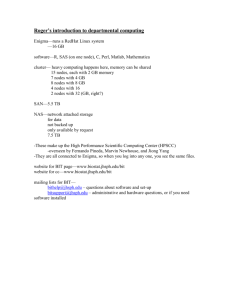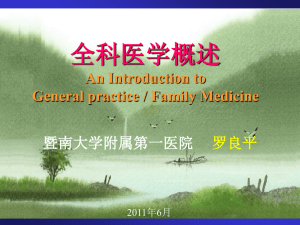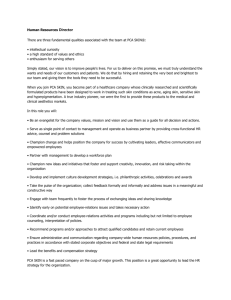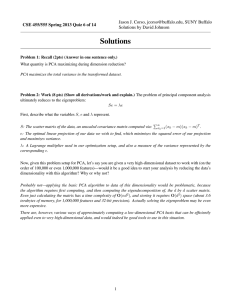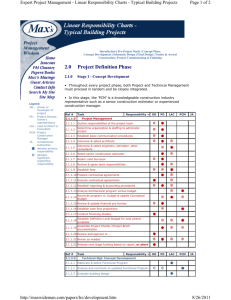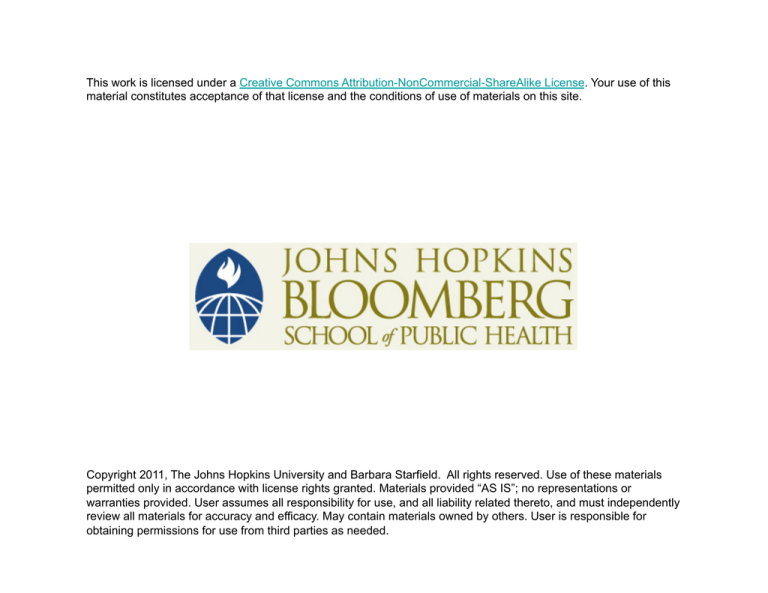
This work is licensed under a Creative Commons Attribution-NonCommercial-ShareAlike License. Your use of this
material constitutes acceptance of that license and the conditions of use of materials on this site.
Copyright 2011, The Johns Hopkins University and Barbara Starfield. All rights reserved. Use of these materials
permitted only in accordance with license rights granted. Materials provided “AS IS”; no representations or
warranties provided. User assumes all responsibility for use, and all liability related thereto, and must independently
review all materials for accuracy and efficacy. May contain materials owned by others. User is responsible for
obtaining permissions for use from third parties as needed.
Primary Care Assessment –
the PCAT
Barbara Starfield, MD, MPH
Primary Care Course
(Based on Cape Town, South Africa, 2007;
and Barcelona, Spain, 2009)
This presentation describes an
instrument to assess experiences with
the various aspects of primary care
from the viewpoint of consumers,
patients, practitioners, and managers,
as well as from an overall systems
view. All versions are comparable in
that they each address the
achievement of important functions of
primary care.
Starfield 02/11
PCB 7466
Evaluating the Delivery
of Primary Care
An existing suite of instruments makes it possible to
evaluate the primary care orientation of health systems and
facilities. It includes surveys of:
• Professionals knowledgeable about the health system
• People in communities
• Patients, professionals, and administrators of health care
facilities
It is known as the PCAT (Primary Care Assessment Tool).
website: http://www.jhsph.edu/pcpc/pca_tools.html
Starfield 01/07
PCM 6669
How Are the Features of Primary
Care Actually Measured?
Principle: Each domain of primary (health)
care has two subdomains, one related to
important characteristics of the facility or
practice and one related to the performance
of the practitioner or facility on primary care
functions.
website: http://www.jhsph.edu/pcpc/pca_tools.html
Starfield 03/11
PCM 6200
The PCAT is used to assess the
achievement of primary care
from the point of view of people
in the community, by patients,
and by health professionals and
managers.
website: http://www.jhsph.edu/pcpc/pca_tools.html
Starfield 3/05
PCM 6385
The Primary Care
Assessment Tool
(PCAT)*
website: http://www.jhsph.edu/pcpc/pca_tools.html
*©Johns Hopkins University
Starfield 02/97
PCM 5072
PCAT Languages
•
•
•
•
•
•
•
•
English
Spanish
Catalan
Portuguese
French (Quebec)
Korean
Turkish
In progress: Mandarin, Maltese
website: http://www.jhsph.edu/pcpc/pca_tools.html
Starfield 04/08
PCM 6970
PCAT
(Primary Care Assessment Tool)
A family of comparable instruments (adult, child) (community,
patients, facilities, providers, managers) to assess the strength
of:
• Primary Health Care systems
• First-contact access and use
• Longitudinality (identification with a place/provider;
interpersonal relationships)
• Comprehensiveness (services available, services provided)
• Coordination (information transfer; integration of care)
• Community orientation
• Cultural sensitivity
• Family-centeredness
website: http://www.jhsph.edu/pcpc/pca_tools.html
Starfield 09/01
PCM 5763
PCAT
(Primary Care Assessment Tool)
• First-contact (access and use)
• Person-focused care over time
• Comprehensiveness (services available
and provided)
• Coordination
• Family centered
• Community oriented
• Culturally competent
website: http://www.jhsph.edu/pcpc/pca_tools.html
Starfield 05/03
PCM 6038
PCAT Versions
Primary Health Care
Systems assessment (policy
makers and managers)
Primary Care
Adult consumer long/short
Child consumer long/short
Facility long/short
Provider long/short
website: http://www.jhsph.edu/pcpc/pca_tools.html
Starfield 05/03
PCM 6039
PCAT Domains
First contact
Longitudinality
Coordination
Comprehensiveness
Family-centeredness
Community orientation
Cultural competence
website: http://www.jhsph.edu/pcpc/pca_tools.html
Starfield 01/02
PCM 5806
Primary Care Domains and
Subdomains: First Contact
First-contact: accessibility
• Health system characteristics that facilitate
access; e.g., if closed on weekend days would the
individual be seen by a practitioner from the
facility?
First-contact: use for each new need
(consumer only)
• Use of primary care place for each new need
(regular checkup, immunization, an acute illness.)
website: http://www.jhsph.edu/pcpc/pca_tools.html
Starfield 05/96
PCM 5015
PCAT: First Contact
Subdomains
Accessibility
Use for first contact
website: http://www.jhsph.edu/pcpc/pca_tools.html
Starfield 01/02
PCM 5807
PCAT: First Contact - Access
1. When your PCP is closed and you get sick
during the night, would someone from there see
or talk with you that night?
2. When your PCP is open and you get sick, would
someone from there see you the same day?
3. When the office is open, can you get advice
quickly over the phone if you need it?
4. When the office is closed, is there a phone
number you can call when you get sick?
website: http://www.jhsph.edu/pcpc/pca_tools.html
Starfield 01/02
PCM 5812
PCAT: First Contact Utilization
I go to my PCP before going somewhere else
a. when I need a regular checkup
b. when I have a new health problem
c. when I have to see a specialist
website: http://www.jhsph.edu/pcpc/pca_tools.html
Starfield 01/02
PCM 5811
Primary Care Domains and
Subdomains: Longitudinality
Longitudinality: strength of affiliation
(consumer only)
• Strength of relationship with a specific provider,
e.g., degree to which the identified provider is also
the place who knows the individual best and from
whom care would be sought for a new problem.
Longitudinality: relationship
• Person orientation of practitioner/patient
interactions, e.g., degree of interest of doctor in the
individual as a person, rather than as someone
with a medical problem.
website: http://www.jhsph.edu/pcpc/pca_tools.html
Starfield 05/96
PCM 5016
PCAT: Longitudinality
Subdomains
Extent of relationship
Interpersonal relationships
website: http://www.jhsph.edu/pcpc/pca_tools.html
Starfield 01/02
PCM 5808
PCAT: Longitudinality
1. When you go to see your PCP, do you see
the same doctor or nurse each time?
2. Does your PCP know you very well as a
person, rather than as someone with a
medical problem?
3. Does your PCP know what problems are
most important to you?
4. If you have a question, can you call and talk
to the doctor who knows you best?
website: http://www.jhsph.edu/pcpc/pca_tools.html
Starfield 01/02
PCM 5813
PCAT*: Primary Care Domains and
Subdomains: Comprehensiveness
Comprehensiveness: services available
• Availability of 11 specific services, e.g.,
family planning.
Comprehensiveness: services provided
• Services received from the primary care
source, e.g., discussions of ways to stay
healthy.
*Primary Care Assessment Tool
website: http://www.jhsph.edu/pcpc/pca_tools.html
Starfield 05/96
PCM 5017
PCAT*:
Comprehensiveness
Subdomains
Services available
Services provided (received)
*Primary Care Assessment Tool
website: http://www.jhsph.edu/pcpc/pca_tools.html
Starfield 01/02
PCM 5810
PCAT*: Comprehensiveness
(Services Available**)
Following is a list of services that you or your
family might need at some time. For each one,
please indicate whether it is available at your
PCP’s office.
1. Family planning or birth control methods
2. Counseling for mental health problems
3. Sewing up a cut that needs stitches
4. Vision screening
*Primary Care Assessment Tool
**Examples
website: http://www.jhsph.edu/pcpc/pca_tools.html
Starfield 01/02
PCM 5815
PCAT*: Comprehensiveness
(Services Provided**)
In visits to your PCP, are any of the following things
discussed with you?
1. Advice about healthy foods and unhealthy foods
2. Ways to handle family conflicts that may arise
from time to time
3. Advice about appropriate exercise for you
4. Checking on and discussing the medications
you are taking
*Primary Care Assessment Tool
**Examples
website: http://www.jhsph.edu/pcpc/pca_tools.html
Starfield 01/02
PCM 5816
Primary Care Domains and
Subdomains: Coordination
Coordination: medical record continuity
(provider only)
• Do you use flow sheets to assure that needed
services are provided? (Also, printed practice
guidelines, periodic medical audits, problem
lists, medication lists.)
Coordination: integration of referrals
• Quality of primary care-referral interface, e.g.,
Did the primary care practitioner know you
made a visit to a specialist?
website: http://www.jhsph.edu/pcpc/pca_tools.html
Starfield 05/96
PCM 5018
PCAT: Coordination
Subdomains
Medical records adequacy
(Provider version only)
Coordination
website: http://www.jhsph.edu/pcpc/pca_tools.html
Starfield 01/02
PCM 5809
PCAT: Coordination
1. Did your PCP discuss with you different places
you could have gone to get help with that
problem?
2. Did your PCP or someone working with your PCP
help you make the appointment for that visit?
3. Did your PCP write down any information for the
specialist about the reason for that visit?
4. After you went to the specialist or special service,
did your PCP talk with you about what happened
at the visit?
website: http://www.jhsph.edu/pcpc/pca_tools.html
Starfield 01/02
PCM 5814
Primary Care Domains and Subdomains:
Family Centeredness, Community Orientation,
Cultural Competence
Family centeredness
• Does doctor ask about opinions of family members
when planning treatment and care?
Community orientation
• Does doctor know about important health problems
of the neighborhood?
Cultural competence
• Would you recommend doctor to someone who uses
folk medicine or has special beliefs about health
care?
website: http://www.jhsph.edu/pcpc/pca_tools.html
Starfield 05/96
PCM 5019
PCAT: Family-centeredness
1. Does your PCP ask you about your ideas
and opinions when planning treatment
and care for you or a family member?
2. Has your PCP asked about illness or
problems that might run in your family?
3. Would your PCP meet with members of
your family if you thought it would be
helpful?
website: http://www.jhsph.edu/pcpc/pca_tools.html
Starfield 01/02
PCM 5817
PCAT: Community Orientation
1. Does anyone at your PCP’s office ever
make home visits?
2. Does your PCP know about the important
health problems of your neighborhood?
3. Does your PCP get opinions and ideas
from people that will help to provide better
health care?
website: http://www.jhsph.edu/pcpc/pca_tools.html
Starfield 01/02
PCM 5818
PCAT: Cultural Competence
1. Would you recommend your PCP to a friend
or relative?
2. Would you recommend your PCP to
someone who does not speak English well?
3. Would you recommend your PCP to
someone who uses folk medicine, such as
herbs or homemade medicines, or has
special beliefs about health care?
website: http://www.jhsph.edu/pcpc/pca_tools.html
Starfield 01/02
PCM 5819
Examples of Items in Primary Care
Domains and Their Components
First contact:
accessibility
Health system characteristics
that facilitate access; e.g., if
facility is closed on weekend
days, would the individual be
seen by a practitioner from
the facility?
Response options: Definitely, Probably, Probably not,
Definitely not, Not sure/don’t remember
website: http://www.jhsph.edu/pcpc/pca_tools.html
Starfield 02/97
PCM 5073
Examples of Items in Primary Care
Domains and Their Components
First contact: use
(consumer only)*
Use of primary care place
for each new need (regular
checkup, immunization, an
acute illness)
Response options: Definitely, Probably, Probably not,
Definitely not, Not sure/don’t remember
*an index, not a scale
website: http://www.jhsph.edu/pcpc/pca_tools.html
Starfield 02/97
PCM 5074
Examples of Items in Primary Care
Domains and Their Components
Longitudinality:
strength of affiliation
(consumer only)
Strength of relationship
with a specific provider,
e.g., degree to which the
identified provider is also
the place that knows the
individual best and from
which care would be
sought for a new problem
3 questions, scored by summing where the place is the same place
website: http://www.jhsph.edu/pcpc/pca_tools.html
Starfield 02/97
PCM 5075
Examples of Items in Primary Care
Domains and Their Components
Longitudinality:
relationship
Person orientation of
practitioner/patient interactions,
e.g., degree of doctor’s interest
in the individual as a person,
rather than as someone with a
medical problem
Response options: Definitely, Probably, Probably not,
Definitely not, Not sure/don’t remember
website: http://www.jhsph.edu/pcpc/pca_tools.html
Starfield 02/97
PCM 5076
Examples of Items in Primary Care
Domains and Their Components
Comprehensiveness:
services available
Availability of specific
services, e.g., family
planning
Comprehensiveness:
services provided
Services received from
the primary care source,
e.g., discussions of ways
to stay healthy
Response options: Definitely, Probably, Probably not,
Definitely not, Not sure/don’t remember
website: http://www.jhsph.edu/pcpc/pca_tools.html
Starfield 02/97
PCM 5077
Examples of Items in Primary Care
Domains and Their Components
Coordination:
medical record
continuity
(provider only)
Do you use flow sheets to
assure that needed services
are provided? (Also, printed
practice guidelines, periodic
medical audits, problem
lists, medication lists)
Response options: Definitely, Probably, Probably not,
Definitely not, Not sure/don’t remember
website: http://www.jhsph.edu/pcpc/pca_tools.html
Starfield 02/97
PCM 5078
Examples of Items in Primary Care
Domains and Their Components
Coordination:
integration of care
Quality of primary carespecialty care interface,
e.g., did the primary care
practitioner know you made
a visit to a specialist?
Response options: Definitely, Probably, Probably not,
Definitely not, Not sure/don’t remember
website: http://www.jhsph.edu/pcpc/pca_tools.html
Starfield 02/97
PCM 5079
The Primary Care Assessment
Tool - Systems Version
This tool assesses the primary health care
and primary care characteristics at the
system level. It addresses all of the primary
care functions.
It is being considered for widespread use in
comparing the primary care orientation of
different health systems, both within and
across countries.
Starfield 10/07
PCM 6871
Website: http://www.jhsph.edu/pcpc/
pca_tools.html
Starfield 10/09
PCM 7224

